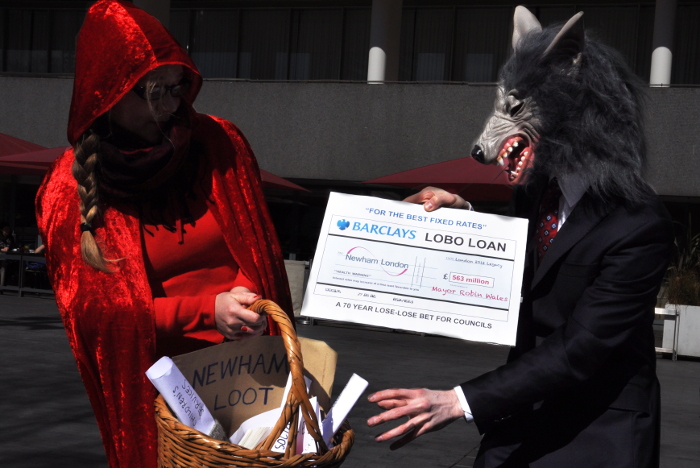It’s the time of year when the board members of large corporations brace themselves for a brief grilling from their shareholders during the annual general meeting. Debt Resistance UK has visited two of these carefully stage-managed events in the last few weeks. We borrowed shares, donned smart clothes and took the opportunity to pose questions to the two largest lenders of LOBO loans to UK local authorities: Barclays and RBS.
Barclays ‘will do the right thing’ about Newham’s £563.5m LOBO debt
Barclays AGM, London, 28th April
First up we attended the Barclays AGM, held at Royal Festival Hall on April 28th. Along with the public services stealing Mr Wolf, we were accompanied by London Borough of Newham Councillor John Whitworth. The Council in Newham is spending the equivalent of 80% of its council tax income on interest payments on its debt, with about £14m each year going to Barclays alone.
Between us we managed to ask Barclays Chairman John McFarlane three questions on LOBO loans at the AGM. Mr McFarlane ducked our first question, in which we asked why Barclays is treating housing associations differently to Councils by allowing them to renegotiate their LOBO loan deals, saying that no local authorities had ever complained to Barclays about being on the losing end of one-sided bank loans.
The next questioner, Cllr Whitworth, painted rather a different picture, asking whether Barclays would be prepared to waive the huge breakage penalties on Newham’s loans (£1.2bn according to Nick Dunbar) and allow the Council to repay early.
After stating that Barclays would ‘do the right thing’ Mr McFarlane defended the bank’s position by essentially saying that market conditions had and would continue to determine the bank’s actions. He then referred the question to the bank’s CFO, Tushar Morzaria, who had this to say:
“As a point of reference, we weren’t actually marketing these structures in the past, these were brought to us through intermediaries. We weren’t dealing with local authorities directly. To the extent that local authorities would like to talk about the situation, to restructure or refinance, then of course we can put you in touch with the right people. We haven’t actually, as far as I’m aware, had any formal complaint with the product, but if you do have concerns I’d be more than happy to discuss that with you.”
A potential olive branch from Barclays to Newham? The offer to discuss potential ways out of Newham’s terrible deals is welcome, but with the leadership of the Council still burying its head in the sand about how much these loans are costing the borough’s residents, the prospect of Wales (Mayor), Hudson (Cabinet Member for Finance) and Hindson (Finance Director) getting round the table with Barclays still looks pretty dire.
Our third question gave us a chance to rebut Mr Morzaria’s claim that Barclays only ever entered into LOBO loan deals via intermediaries. In fact, Newham’s finance officers have boasted about how they avoided paying commission to brokers by dealing with Barclays direct. (Could it be just a coincidence that the council which went straight to the banks is also the council with the biggest LOBO problem?)
We asked whether Barclays would divulge the amount of commission it paid to ICAP to arrange LOBO loans with Kent County Council (LOBO debt: £441.8m) while the council was taking financial advice from Butlers, a subsidiary of ICAP. Needless to say, Barclays declined to answer.
RBS unmoved by Edinburgh’s £241m LOBO debt predicament
RBS AGM, Gogarburn, 4th May
8 years on from the 2008 banking crisis and £45 billion RBS bailout, the faces may have changed, but many of the issues remain the same. RBS boldly proclaims to be a “bank that earns your trust”, and that “the future is not about us, it’s about our customers”.
Yet behind the fancy phrases and meaningless marketing remains a bank that is hard-wired to serve vested interests over the public interest.
How else can you describe a bank that is headquartered in Edinburgh and which was built on that City’s famous financial history, yet is happy to run that same city into the ground through punitive interest rates and punishing, potentially illegal LOBO loans?
Edinburgh Council took out £241 million of LOBO Loans, £40m of which are toxic “inverse floater” RBS LOBO Loans which would cost £110 million to repay today at interest rates of around 7%.
The interest Edinburgh Council pays to service these debts, is equivalent to 50% of its annual Council Tax income.
Joel Benjamin asked Ross McEwan about his dislike of Teaser Rate Loans (listen here).
CEO Ross McEwan claims that ‘teaser rates’ on loans are a “personal bugbear” that he wants to stamp out at RBS – yet this is exactly what around 100 councils have to suffer from RBS LOBO loans. These Councils were attracted by low teaser rates that were subsequently replaced by sky-high rates. They are also subject to break clauses that would charge such high fees were the councils to repay the loans that they effectively prevent the councils from rescheduling their debt. Hardly a bank that earns your trust, let alone operates in the public interest.
Ross McEwan and the rest of the board were unmoved by our questions on LOBO loans and gave no indication that they were prepared to enter into renewed negotiations with councils who wished to exit the deals.
McEwan flatly disagreed that local authorities should be treated as retail investors, as they now are across Europe, instead of as sophisticated investors who are expected to have a greater degree of financial expertise. Regulators allowing councils to be treated as sophisticated investors allows banks including RBS to rip these councils off with impunity.
McEwan also refused to concede that these LOBO loans had been mis-sold, or that the contracts should be ripped up or even renegotiated.
Posted in Blog